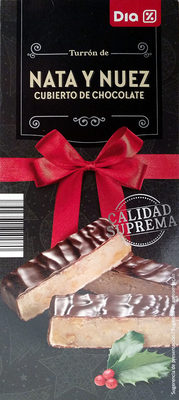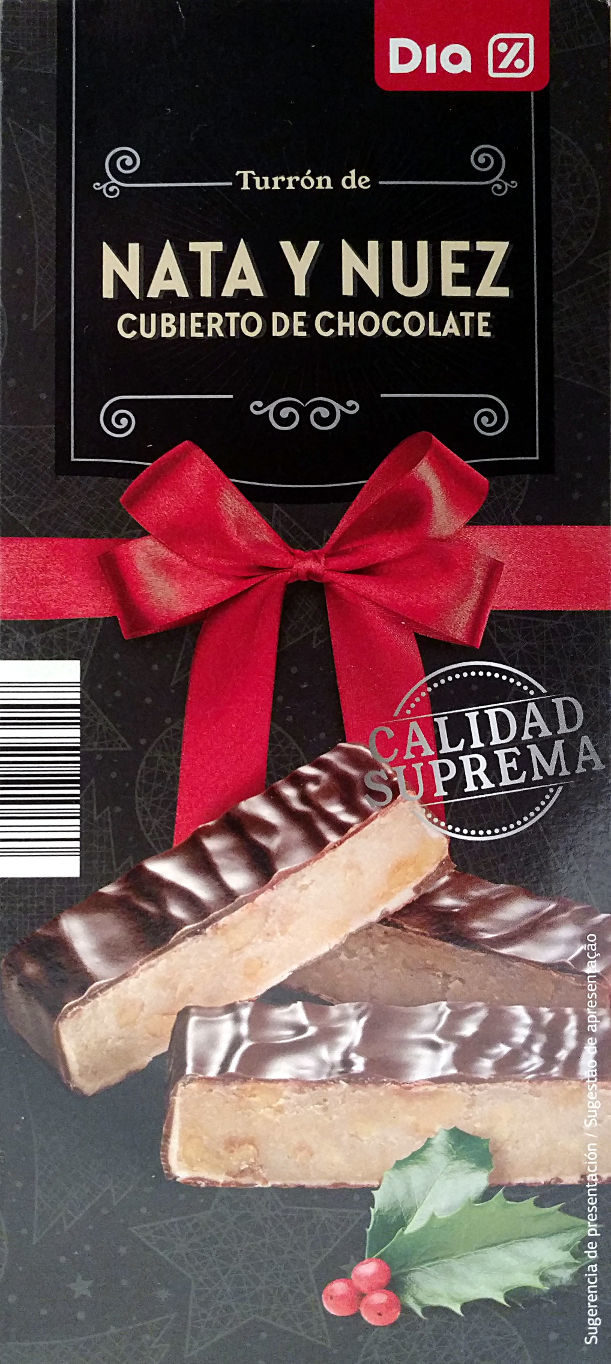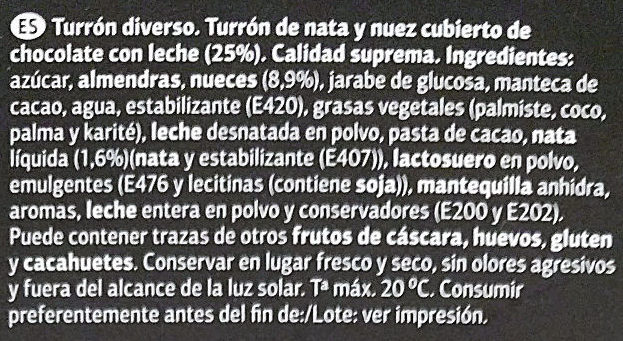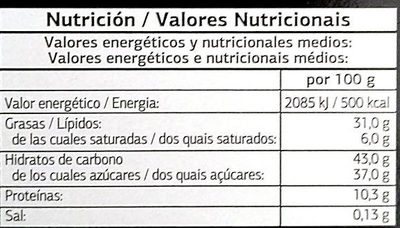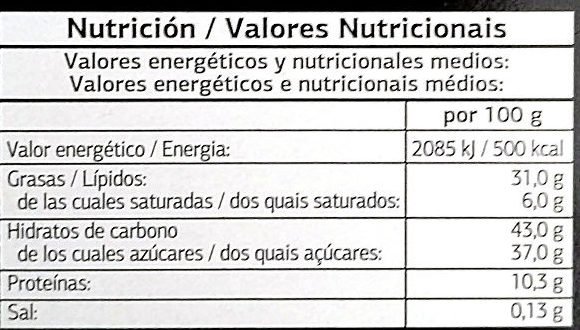Ajuda'ns a fer que la transparència alimentària sigui la norma!
Com a organització sense ànim de lucre, depenem de les vostres donacions per continuar informant els consumidors de tot el món sobre tot allò què mengen.
La revolució alimentària comença amb tu!
Turrón de nata y nuez cubierto de chocolate - DIA - 200 g
Turrón de nata y nuez cubierto de chocolate - DIA - 200 g
Aquesta pàgina del producte no està completa. Podeu ajudar a completar-la editant-la i afegint-hi més dades a partir de les fotos ja disponibles, o fent-ne més amb l'aplicació de androide o iPhone / iPad. Gràcies!
×
Codi de barres: 8480017193247 (EAN / EAN-13)
Nom comú: Turrón de nata y nuez cubierto de chocolate
Quantitat: 200 g
Empaquetament: en:Box
Marques: DIA
Categories: Snacks, Aperitius dolços, Llaminadures, Aliments festius, Aliments i begudes de Nadal, Dolços de Nadal, Torró
Botigues: DIA
Països on es va vendre: Espanya
Matching with your preferences
Salut
Ingredients
-
25 ingredients
: azúcar, almendras, nueces 8,9%, jarabe de glucosa, manteca de cacao, agua, E420, grasas vegetales (palmiste, coco, palma, karité), leche desnatada en polvo, pasta de cacao, nata líquida 1,6% (nata, E407), lactosuero en polvo, E476, lecitinas (soja), mantequilla anhidra, aromas, leche entera en polvo, E200, E202Al·lèrgens: en:Milk, en:Nuts, en:Soybeans, es:lactosuero, es:mantequilla, es:nata-liquida, es:lactosuero, es:mantequilla, es:nata-liquidaRastres: en:Eggs, en:Gluten, en:Nuts, en:Peanuts
Processament d'aliments
-
Aliments ultra processats
Elements que indiquen que el producte està al grup 4 - Aliments i begudes ultraprocessats:
- Additiu: E322 - Lecitines
- Additiu: E407 - Carragahen
- Additiu: E420 - Sorbitol
- Additiu: E476 - Poliricinoleat de poligliceril
- Ingredient: Aromes
- Ingredient: Glucosa
- Ingredient: Xarop de glucosa
- Ingredient: Sèrum de llet
Els productes alimentaris es classifiquen en 4 grups segons el seu grau de processament:
- Aliments no processats o mínimament processats
- Ingredients culinaris processats
- Aliments processats
- Aliments ultra processats
La determinació del grup es fa en funció de la categoria del producte i dels ingredients que conté.
Additius
-
E200 - Àcid sòrbic
Sorbic acid: Sorbic acid, or 2‚4-hexadienoic acid, is a natural organic compound used as a food preservative. It has the chemical formula CH3-CH-4CO2H. It is a colourless solid that is slightly soluble in water and sublimes readily. It was first isolated from the unripe berries of the Sorbus aucuparia -rowan tree-, hence its name.Origen: Wikipedia (Anglès)
-
E202 - Sorbat de potassi
Potassium sorbate: Potassium sorbate is the potassium salt of sorbic acid, chemical formula CH3CH=CH−CH=CH−CO2K. It is a white salt that is very soluble in water -58.2% at 20 °C-. It is primarily used as a food preservative -E number 202-. Potassium sorbate is effective in a variety of applications including food, wine, and personal-care products. While sorbic acid is naturally occurring in some berries, virtually all of the world's production of sorbic acid, from which potassium sorbate is derived, is manufactured synthetically.Origen: Wikipedia (Anglès)
-
E322 - Lecitines
Lecithin: Lecithin -UK: , US: , from the Greek lekithos, "egg yolk"- is a generic term to designate any group of yellow-brownish fatty substances occurring in animal and plant tissues, which are amphiphilic – they attract both water and fatty substances -and so are both hydrophilic and lipophilic-, and are used for smoothing food textures, dissolving powders -emulsifying-, homogenizing liquid mixtures, and repelling sticking materials.Lecithins are mixtures of glycerophospholipids including phosphatidylcholine, phosphatidylethanolamine, phosphatidylinositol, phosphatidylserine, and phosphatidic acid.Lecithin was first isolated in 1845 by the French chemist and pharmacist Theodore Gobley. In 1850, he named the phosphatidylcholine lécithine. Gobley originally isolated lecithin from egg yolk—λέκιθος lekithos is "egg yolk" in Ancient Greek—and established the complete chemical formula of phosphatidylcholine in 1874; in between, he had demonstrated the presence of lecithin in a variety of biological matters, including venous blood, in human lungs, bile, human brain tissue, fish eggs, fish roe, and chicken and sheep brain. Lecithin can easily be extracted chemically using solvents such as hexane, ethanol, acetone, petroleum ether, benzene, etc., or extraction can be done mechanically. It is usually available from sources such as soybeans, eggs, milk, marine sources, rapeseed, cottonseed, and sunflower. It has low solubility in water, but is an excellent emulsifier. In aqueous solution, its phospholipids can form either liposomes, bilayer sheets, micelles, or lamellar structures, depending on hydration and temperature. This results in a type of surfactant that usually is classified as amphipathic. Lecithin is sold as a food additive and dietary supplement. In cooking, it is sometimes used as an emulsifier and to prevent sticking, for example in nonstick cooking spray.Origen: Wikipedia (Anglès)
-
E407 - Carragahen
Carrageenan: Carrageenans or carrageenins - karr-ə-gee-nənz, from Irish carraigín, "little rock"- are a family of linear sulfated polysaccharides that are extracted from red edible seaweeds. They are widely used in the food industry, for their gelling, thickening, and stabilizing properties. Their main application is in dairy and meat products, due to their strong binding to food proteins. There are three main varieties of carrageenan, which differ in their degree of sulfation. Kappa-carrageenan has one sulfate group per disaccharide, iota-carrageenan has two, and lambda-carrageenan has three. Gelatinous extracts of the Chondrus crispus -Irish moss- seaweed have been used as food additives since approximately the fifteenth century. Carrageenan is a vegetarian and vegan alternative to gelatin in some applications or may be used to replace gelatin in confectionery.Origen: Wikipedia (Anglès)
-
E420 - Sorbitol
Sorbitol: Sorbitol --, less commonly known as glucitol --, is a sugar alcohol with a sweet taste which the human body metabolizes slowly. It can be obtained by reduction of glucose, which changes the aldehyde group to a hydroxyl group. Most sorbitol is made from corn syrup, but it is also found in nature, for example in apples, pears, peaches, and prunes. It is converted to fructose by sorbitol-6-phosphate 2-dehydrogenase. Sorbitol is an isomer of mannitol, another sugar alcohol; the two differ only in the orientation of the hydroxyl group on carbon 2. While similar, the two sugar alcohols have very different sources in nature, melting points, and uses.Origen: Wikipedia (Anglès)
-
E476 - Poliricinoleat de poligliceril
Polyglycerol polyricinoleate: Polyglycerol polyricinoleate -PGPR-, E476, is an emulsifier made from glycerol and fatty acids -usually from castor bean, but also from soybean oil-. In chocolate, compound chocolate and similar coatings, PGPR is mainly used with another substance like lecithin to reduce viscosity. It is used at low levels -below 0.5%-, and works by decreasing the friction between the solid particles -e.g. cacao, sugar, milk- in molten chocolate, reducing the yield stress so that it flows more easily, approaching the behaviour of a Newtonian fluid. It can also be used as an emulsifier in spreads and in salad dressings, or to improve the texture of baked goods. It is made up of a short chain of glycerol molecules connected by ether bonds, with ricinoleic acid side chains connected by ester bonds. PGPR is a yellowish, viscous liquid, and is strongly lipophilic: it is soluble in fats and oils and insoluble in water and ethanol.Origen: Wikipedia (Anglès)
Anàlisi dels ingredients
-
Oli de palma
Ingredients que contenen oli de palma: Palmist, en:Palm
-
No és vegà
Ingredients no vegans: Llet desnatada en pols, en:Whipping cream, Nata, Xerigot en pols, en:Butterfat, Llet sencera en pols
-
Pot ser vegetarià
Ingredients que potser no són vegetarians: Xerigot en pols, E322, Aromes
-
Detalls de l'anàlisi dels ingredients
: azúcar, _almendras_, _nueces_ 8.9%, jarabe de glucosa, manteca de cacao, agua, e420, grasas vegetales (palmiste, coco, palma, karité), _leche_ desnatada en polvo, pasta de cacao, _nata líquida_ 1.6% (nata, e407), _lactosuero_ en polvo, e476, lecitinas, _mantequilla_ anhidra, aromas, _leche_ entera en polvo, e200, e202- azúcar -> en:sugar - vegan: yes - vegetarian: yes - ciqual_proxy_food_code: 31016 - percent_min: 8.9 - percent_max: 69.4
- _almendras_ -> en:almond - vegan: yes - vegetarian: yes - ciqual_food_code: 15041 - percent_min: 8.9 - percent_max: 39.15
- _nueces_ -> en:walnut - vegan: yes - vegetarian: yes - ciqual_food_code: 15023 - percent_min: 8.9 - percent: 8.9 - percent_max: 8.9
- jarabe de glucosa -> en:glucose-syrup - vegan: yes - vegetarian: yes - ciqual_proxy_food_code: 31016 - percent_min: 1.6 - percent_max: 8.9
- manteca de cacao -> en:cocoa-butter - vegan: yes - vegetarian: yes - ciqual_food_code: 16030 - percent_min: 1.6 - percent_max: 8.9
- agua -> en:water - vegan: yes - vegetarian: yes - ciqual_food_code: 18066 - percent_min: 1.6 - percent_max: 8.9
- e420 -> en:e420 - vegan: yes - vegetarian: yes - percent_min: 1.6 - percent_max: 8.9
- grasas vegetales -> en:vegetable-fat - vegan: yes - vegetarian: yes - from_palm_oil: maybe - percent_min: 1.6 - percent_max: 8.9
- palmiste -> en:palm-kernel-oil - vegan: yes - vegetarian: yes - from_palm_oil: yes - percent_min: 0.4 - percent_max: 8.9
- coco -> en:coconut - vegan: yes - vegetarian: yes - ciqual_proxy_food_code: 15006 - percent_min: 0 - percent_max: 4.45
- palma -> en:palm - vegan: yes - vegetarian: yes - from_palm_oil: yes - ciqual_food_code: 16129 - percent_min: 0 - percent_max: 2.96666666666667
- karité -> en:shea-butter - vegan: yes - vegetarian: yes - from_palm_oil: no - percent_min: 0 - percent_max: 2.225
- _leche_ desnatada en polvo -> en:skimmed-milk-powder - vegan: no - vegetarian: yes - ciqual_food_code: 19054 - percent_min: 1.6 - percent_max: 8.9
- pasta de cacao -> en:cocoa-paste - vegan: yes - vegetarian: yes - ciqual_proxy_food_code: 16030 - percent_min: 1.6 - percent_max: 8.9
- _nata líquida_ -> en:whipping-cream - vegan: no - vegetarian: yes - ciqual_food_code: 19402 - percent_min: 1.6 - percent: 1.6 - percent_max: 1.6
- nata -> en:cream - vegan: no - vegetarian: yes - ciqual_food_code: 19402 - percent_min: 0.8 - percent_max: 1.6
- e407 -> en:e407 - vegan: yes - vegetarian: yes - percent_min: 0 - percent_max: 0.8
- _lactosuero_ en polvo -> en:whey-powder - vegan: no - vegetarian: maybe - percent_min: 0 - percent_max: 1.6
- e476 -> en:e476 - vegan: yes - vegetarian: yes - percent_min: 0 - percent_max: 1.6
- lecitinas -> en:e322 - vegan: maybe - vegetarian: maybe - percent_min: 0 - percent_max: 1.6
- _mantequilla_ anhidra -> en:butterfat - vegan: no - vegetarian: yes - from_palm_oil: maybe - ciqual_food_code: 16401 - percent_min: 0 - percent_max: 1.6
- aromas -> en:flavouring - vegan: maybe - vegetarian: maybe - percent_min: 0 - percent_max: 1.6
- _leche_ entera en polvo -> en:whole-milk-powder - vegan: no - vegetarian: yes - ciqual_food_code: 19021 - percent_min: 0 - percent_max: 1.6
- e200 -> en:e200 - vegan: yes - vegetarian: yes - percent_min: 0 - percent_max: 1.6
- e202 -> en:e202 - vegan: yes - vegetarian: yes - percent_min: 0 - percent_max: 1.6
Nutrició
-
Mala qualitat nutricional
⚠ ️Atenció: la quantitat de fibra no s'especifica, no es tindrà en compte la seva possible contribució positiva en la qualificació.⚠ ️Atenció: la quantitat de fruita, verdura i fruits secs no s'especifica a l'etiqueta, s'ha fet una estimació a partir de la llista d'ingredients: 33Aquest producte no es considera una beguda per al càlcul de la Nutri-Score.
Punts positius: 0
- Proteïnes: 5 / 5 (valor: 9, valor arrodonit: 9)
- Fibra: 0 / 5 (valor: 0, valor arrodonit: 0)
- Fruites, verdures, fruits secs i olis de colza/nou/oliva: 0 / 5 (valor: 33.890625, valor arrodonit: 33.9)
Punts negatius: 23
- Energia: 6 / 10 (valor: 2146, valor arrodonit: 2146)
- Sucres: 9 / 10 (valor: 44, valor arrodonit: 44)
- Greixos saturats: 8 / 10 (valor: 9, valor arrodonit: 9)
- Sodi: 0 / 10 (valor: 32, valor arrodonit: 32)
Els punts per proteïnes no es compten perquè els punts negatius són més o iguals a 11.
Puntuació nutricional: (23 - 0)
Nutri-Score:
-
Nivells de nutrients
-
Greix en alta quantitat (28%)
Què us cal saber- Un alt consum de greixos, especialment de greixos saturats, pot augmentar el colesterol, que augmenta el risc de patir malalties del cor.
Recomanació: Reduïu el consum de greixos i greixos saturats- Trieu productes amb menys greixos i greixos saturats.
-
Àcid gras saturat en alta quantitat (9%)
Què us cal saber- Un alt consum de greixos, especialment de greixos saturats, pot augmentar el colesterol, que augmenta el risc de patir malalties del cor.
Recomanació: Reduïu el consum de greixos i greixos saturats- Trieu productes amb menys greixos i greixos saturats.
-
Sucre en alta quantitat (44%)
Què us cal saber- Un alt consum de sucre pot provocar augment de pes i càries dental. També augmenta el risc de patir diabetis tipus 2 i malalties cardiovasculars.
Recomanació: Limitau el consum de sucre i de begudes ensucrades- Les begudes ensucrades (com ara refrescos, begudes de fruites i sucs i nèctars de fruites) s'han de limitar tant com sigui possible (no més d'1 got al dia).
- Triau productes amb menor contingut de sucre i reduïu el consum de productes amb sucres afegits.
-
Sal comuna en baixa quantitat (0.08%)
Què us cal saber- Un alt consum de sal (o sodi) pot provocar un augment de la pressió arterial, que pot augmentar el risc de patir malalties del cor i ictus.
- Moltes persones que tenen hipertensió no ho saben, ja que sovint no en tenen símptomes.
- La majoria de la gent consumeix massa sal (de 9 a 12 grams de mitjana al dia), al voltant del doble del nivell màxim d'ingesta recomanat.
Recomanació: Limitau la ingesta de sal i d'aliments rics en sal- Reduïu la sal que emprau quan cuinau, i no afegiu sal a taula.
- Limiteu el consum d'aperitius salats i trieu productes amb menor contingut de sal.
-
-
Informació nutricional
Informació nutricional Com es ven
per 100 g/100 mlComparat amb: Torró Energia 2.146 kj
(513 kcal)-2% Greix 28 g -14% Àcid gras saturat 9 g -4% Hidrats de carboni 55 g +20% Sucre 44 g +17% Fiber ? Proteïna 9 g -15% Sal comuna 0,08 g -35% Fruits‚ vegetables‚ nuts and rapeseed‚ walnut and olive oils (estimate from ingredients list analysis) 33,891 %
Entorn
-
Eco-puntuació D - Impacte ambiental alt
El Eco-Score és una puntuació experimental que resumeix els impactes ambientals dels productes alimentaris.→ L'Eco-Score es va desenvolupar inicialment a França i s'està ampliant per a altres països europeus. La fórmula Eco-Score està subjecta a canvis, ja que es millora periòdicament per fer-la més precisa i més adequada per a cada país.Anàlisi del cicle de vida
-
Impacte mitjà dels productes de la mateixa categoria: C (Score: 58/100)
Categoria: Nougat
Categoria: Nougat
- Puntuació ambiental PEF ( petjada ambiental de l'aliment ): 0.45 (com més baixa sigui la puntuació, menor serà l'impacte)
- incloent l'impacte sobre el canvi climàtic: 2.01 kg CO₂ eq/kg del producte
Etapa Impacte Agricultura
80.9 %Processament
8.4 %Empaquetament
5.1 %Transport
4.6 %Distribució
1.0 %Consum
0.0 %
Bonificacions i punts negatius
-
Falta informació sobre l'origen dels ingredients
Punts negatius: -5
⚠ ️ L'origen dels ingredients d'aquest producte no està indicat.
Si estan indicats a l'embalatge, podeu modificar la fitxa del producte i afegir-los.
Si sou el fabricant d'aquest producte, podeu enviar-nos la informació amb la nostra plataforma gratuïta per a productors.
-
Ingredients que amenacen les espècies
Punts negatius: -10
Conté oli de palma
Els boscos tropicals d'Àsia, Àfrica i Amèrica Llatina es destrueixen per crear i ampliar les plantacions de palmera d'oli. La desforestació contribueix al canvi climàtic, i posa en perill espècies com l'orangutan, l'elefant pigmeu i el rinoceront de Sumatra.
-
Embalatge d'impacte mitjà
Punts negatius: -10
Forma Material Reciclatge Impacte Box Unknown Alt ⚠ ️ La informació sobre l'embalatge d'aquest producte no és prou precisa (formes i materials exactes de tots els components de l'embalatge).⚠ ️ Per a un càlcul més precís de l'Eco-Score, podeu modificar la pàgina del producte i afegir-los.
Si sou el fabricant d'aquest producte, podeu enviar-nos la informació amb la nostra plataforma gratuïta per a productors.
Eco-Score per a aquest producte
-
Impacte per a aquest producte: D (Score: 33/100)
Producte: Turrón de nata y nuez cubierto de chocolate - DIA - 200 g
Puntuació de l'anàlisi del cicle de vida: 58
Suma de bonificacions i punts negatius: -25
Puntuació final: 33/100
-
Petjada de carboni
-
Equivalent a conduir 1.0 km en un cotxe de gasolina
201 g de CO² per cada 100 g de producte
La xifra d'emissions de carboni prové de la base de dades Agribalyse d'ADEME, per a la categoria: Nougat (Font: Base de dades ADEME Agribalyse)
Etapa Impacte Agricultura
61.8 %Processament
12.9 %Empaquetament
13.5 %Transport
10.9 %Distribució
0.9 %Consum
0.0 %
Empaquetament
-
Embalatge d'impacte mitjà
-
Materials d'embalatge
Material % Pes de l'embalatge Pes de l'embalatge per 100 g de producte
-
Transport
-
Orígens dels ingredients
Falta informació sobre l'origen dels ingredients
⚠ ️ L'origen dels ingredients d'aquest producte no està indicat.
Si estan indicats a l'embalatge, podeu modificar la fitxa del producte i afegir-los.
Si sou el fabricant d'aquest producte, podeu enviar-nos la informació amb la nostra plataforma gratuïta per a productors.Add the origins of ingredients for this product Add the origins of ingredients for this product
Espècies amenaçades
-
Conté oli de palma
Fomenta la desforestació i amenaça espècies com l'orangutan
Els boscos tropicals d'Àsia, Àfrica i Amèrica Llatina es destrueixen per crear i ampliar les plantacions de palmera d'oli. La desforestació contribueix al canvi climàtic, i posa en perill espècies com l'orangutan, l'elefant pigmeu i el rinoceront de Sumatra.
Report a problem
-
Incomplete or incorrect information?
Category, labels, ingredients, allergens, nutritional information, photos etc.
If the information does not match the information on the packaging, please complete or correct it. Open Food Facts is a collaborative database, and every contribution is useful for all.
Fonts de dades
Producte afegit per dhekir
Última modificació de la pàgina del producte per packbot.
La pàgina del producte, també editada per kiliweb, thaialagata, yuka.SDZrcERQVU5wOE1SaXZZditqcjErUEJ4MWNUMFFIMlZGOFEwSVE9PQ.
